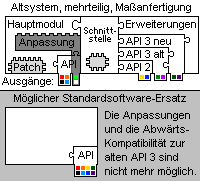Legacy system
![]()
This article or subsequent section is not sufficiently supported by evidence (e.g., anecdotal evidence). Information without sufficient evidence may be removed in the near future. Please help Wikipedia by researching the information and adding good supporting evidence.
In information technology, the term legacy system refers to an established, historically grown application in the area of enterprise software. In this context, the word legacy is a largely value-free technical term, but it can also be used colloquially in a negative sense in the sense of an annoying "legacy" or "old burden" in a figurative sense.
Within the application landscape of a company, it is mostly mainframe-based individual developments that are often characterized by insufficient documentation, outdated operating and development environments, numerous interfaces and high complexity. The centralized data and functional approach found there has been considered outdated since the client/server euphoria.
These characteristics are the reason why the replacement of such systems often drags on well beyond a desired end of life. In both economic upswings and downturns, systems are often reprioritized in order to avoid the high failure risks or conversion costs associated with a replacement, especially since the mere replacement of a legacy system is not associated with direct added value, but rather mostly only with the saving of imputed costs (costs for temporary or permanent failure) or opportunity costs (lost sales due to limited performance of the legacy system).
A fundamental problem in the replacement of legacy systems is the grown range of functions. Even if a wide-ranging replacement with powerful standard software takes place quite frequently, additional functions and interfaces that are not covered usually remain. These are often unique selling points of the grown software developed over decades, which standard software does not necessarily have. Often, a retread of the systems is already difficult because they have not been described consistently throughout history, for example with requirements, use cases, etc.
The use of service-oriented architectures offers useful approaches to cover the interface problem by using connectors. In this case, the systems to be exchanged are "encapsulated" externally by an intermediate layer consisting of different source systems operating a common interface.

Illustration of a legacy system and the problems encountered when switching to new software
See also
- Brownfield (software development)
Questions and Answers
Q: What is a legacy?
A: A legacy is something that someone gets by inheritance, or by a will. It can also refer to something handed down from one period of time to another, such as an idea or moral code.
Q: How does the concept of legacy relate to heritage and inheritance?
A: Legacy is similar to heritage and inheritance in that it refers to something we inherit from past generations and pass on to our future generations. Heritage usually refers more specifically to material and economical inheritance, while legacy typically refers more broadly to immaterial and cultural inheritance.
Q: What are some examples of legacies?
A: Examples of legacies include moral codes passed down from religious or philosophical teachers, scientific ideas inherited from Ancient Greece, democracy developed in Athens, Roman laws which became a legal legacy for later civilizations, architecture imitated from Ancient Rome or Greece, heirlooms passed down within families, source code reused in new software development (known as "legacy code"), etc.
Q: Who was Euclid of Alexandria?
A: Euclid of Alexandria was a Greek Mathematician who collected and wrote down ideas about geometry and measurement in a text called Elements over 2000 years ago. Students still use these ideas when they learn about mathematics today.
Q: How did Islamic science use its own legacy rather than those of other cultures?
A: Islamic science used its own unique set of knowledge rather than relying upon the legacies left behind by other cultures when developing their scientific theories.
Q: What does it mean when people say that countries or civilizations can leave a legacy?
A: When people say that countries or civilizations can leave a legacy they are referring to an idea that will be remembered for a long time - this is an extension of the original meaning(s) associated with the concept which were related more specifically to individual people leaving behind legacies for future generations.
Search within the encyclopedia